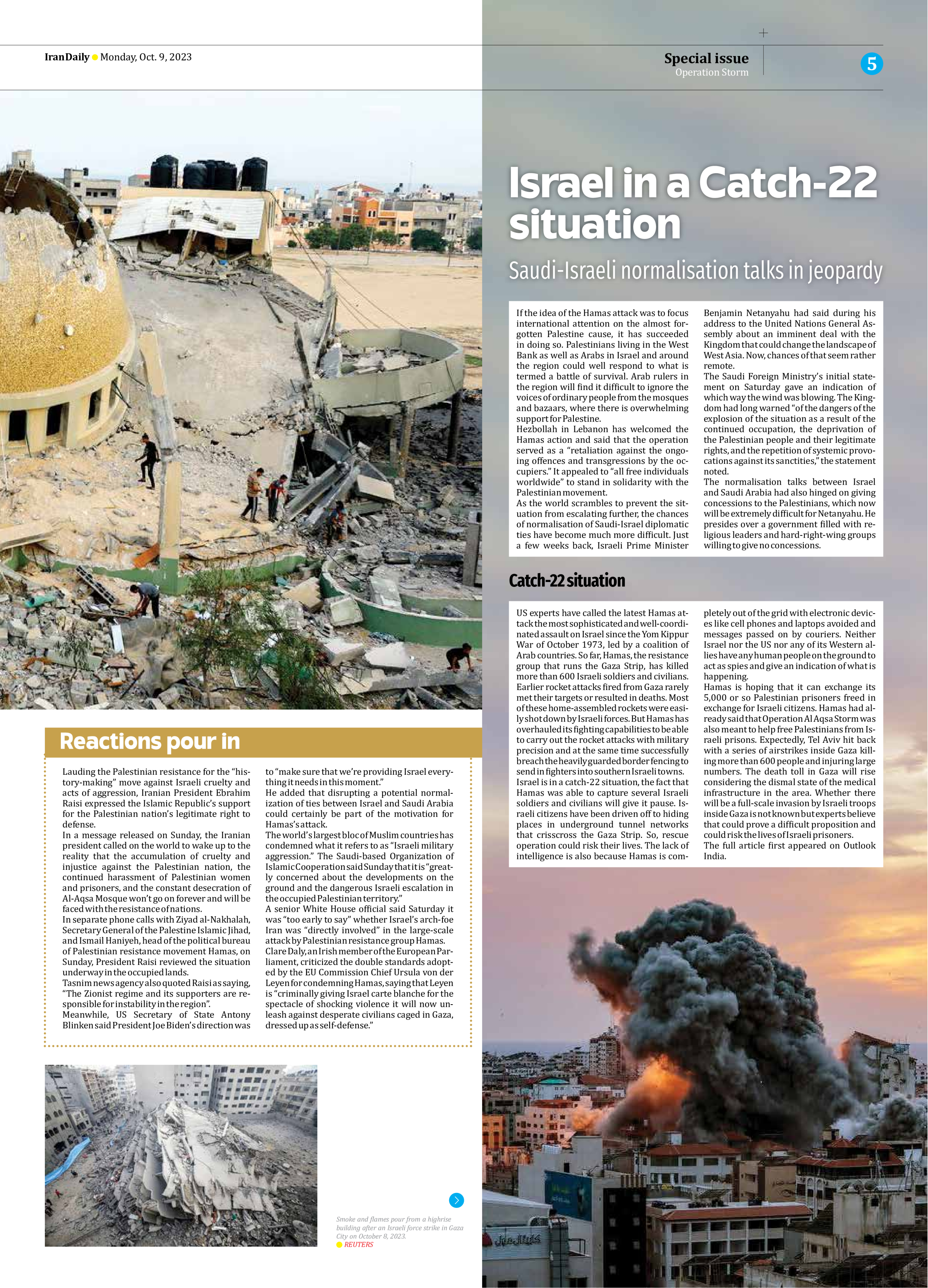
Israel in a Catch-22 situation
Saudi-Israeli normalisation talks in jeopardy
If the idea of the Hamas attack was to focus international attention on the almost forgotten Palestine cause, it has succeeded in doing so. Palestinians living in the West Bank as well as Arabs in Israel and around the region could well respond to what is termed a battle of survival. Arab rulers in the region will find it difficult to ignore the voices of ordinary people from the mosques and bazaars, where there is overwhelming support for Palestine.
Hezbollah in Lebanon has welcomed the Hamas action and said that the operation served as a “retaliation against the ongoing offences and transgressions by the occupiers.” It appealed to “all free individuals worldwide” to stand in solidarity with the Palestinian movement.
As the world scrambles to prevent the situation from escalating further, the chances of normalisation of Saudi-Israel diplomatic ties have become much more difficult. Just a few weeks back, Israeli Prime Minister Benjamin Netanyahu had said during his address to the United Nations General Assembly about an imminent deal with the Kingdom that could change the landscape of West Asia. Now, chances of that seem rather remote.
The Saudi Foreign Ministry’s initial statement on Saturday gave an indication of which way the wind was blowing. The Kingdom had long warned “of the dangers of the explosion of the situation as a result of the continued occupation, the deprivation of the Palestinian people and their legitimate rights, and the repetition of systemic provocations against its sanctities,” the statement noted.
The normalisation talks between Israel and Saudi Arabia had also hinged on giving concessions to the Palestinians, which now will be extremely difficult for Netanyahu. He presides over a government filled with religious leaders and hard-right-wing groups willing to give no concessions.
Catch-22 situation
US experts have called the latest Hamas attack the most sophisticated and well-coordinated assault on Israel since the Yom Kippur War of October 1973, led by a coalition of Arab countries. So far, Hamas, the resistance group that runs the Gaza Strip, has killed more than 600 Israeli soldiers and civilians. Earlier rocket attacks fired from Gaza rarely met their targets or resulted in deaths. Most of these home-assembled rockets were easily shot down by Israeli forces. But Hamas has overhauled its fighting capabilities to be able to carry out the rocket attacks with military precision and at the same time successfully breach the heavily guarded border fencing to send in fighters into southern Israeli towns.
Israel is in a catch-22 situation, the fact that Hamas was able to capture several Israeli soldiers and civilians will give it pause. Israeli citizens have been driven off to hiding places in underground tunnel networks that crisscross the Gaza Strip. So, rescue operation could risk their lives. The lack of intelligence is also because Hamas is completely out of the grid with electronic devices like cell phones and laptops avoided and messages passed on by couriers. Neither Israel nor the US nor any of its Western allies have any human people on the ground to act as spies and give an indication of what is happening.
Hamas is hoping that it can exchange its 5,000 or so Palestinian prisoners freed in exchange for Israeli citizens. Hamas had already said that Operation Al Aqsa Storm was also meant to help free Palestinians from Israeli prisons. Expectedly, Tel Aviv hit back with a series of airstrikes inside Gaza killing more than 600 people and injuring large numbers. The death toll in Gaza will rise considering the dismal state of the medical infrastructure in the area. Whether there will be a full-scale invasion by Israeli troops inside Gaza is not known but experts believe that could prove a difficult proposition and could risk the lives of Israeli prisoners.
The full article first appeared on Outlook India.







